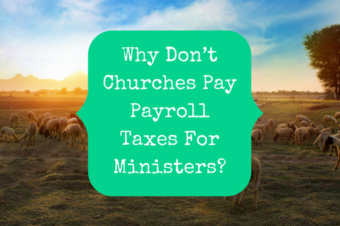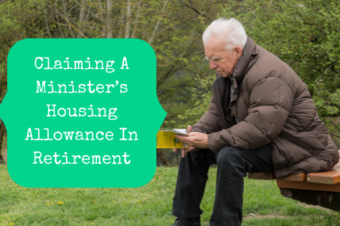
While pastors have the unique opportunity to opt out of the Social Security system, that doesn’t mean that they cannot participate at all. If your spouse has earned enough Social Security credits to be eligible for benefits, then you are eligible for some benefits as well. These are the spousal benefits that you can receive:
Medicare Benefits
Many people wrongly believe that opting out of Social Security means that you can no longer participate in Medicare. Everyone age 65 or older who is a US citizen or permanent resident and has lived in the US for at least 5 years is eligible for Medicare (and some other people, too). The difference that opting out makes is whether or not you have to pay for Part A, which is hospital insurance.
If you opt out with Form 4361, then you have to pay premiums for Part A while everyone else gets it for free. Unless your spouse is eligible for benefits. You can get premium-free Part A as a spousal benefit if you are at least 65-years-old and your spouse is at least 62-years-old. If your eligible spouse is only 60 when you turn 65 and sign up for Medicare, then you will have to pay Part A premiums for a couple of years until your spouse turns 62.
Retirement Benefits
You can also receive retirement benefits based on your spouse’s record if he or she is also collecting retirement benefits. To be eligible for spousal retirement benefits, you must be at least age 62 or caring for a qualifying child. To qualify, a child must be under age 16 or receiving Social Security disability benefits.
Social Security retirement benefits change based on when you start collecting them. The base benefit for spouses of eligible workers is half of the benefit the worker is eligible for at full retirement age. The benefit is reduced if taken before full retirement age (using the same schedule as eligible workers). For spousal benefits, they can be reduced to as little as 32.5% of the worker’s full retirement age benefit. Here is a calculator that illustrates the effects of claiming early benefits.
While workers can increase their benefits by waiting until after their full retirement age to collect them, that option is not available for spouses. No matter how long you wait, the most you can get is half of the benefit that your spouse is eligible for at full retirement age. At least while your spouse is alive.
Survivor Benefits
If your spouse passes away, you can still receive Social Security benefits based on their work record. Widows and widowers are eligible for a one-time lump sum payment of $255. Luckily, you are also eligible to receive their retirement benefits, since $255 won’t get you very far these days.
You can receive your spouse’s full retirement benefit at your full retirement age or can receive a reduced benefit as early as age 60. You can receive benefits as early as age 50 if you are disabled and the disability started before or within seven years of your spouse’s death. If you are not remarried and are taking care of your deceased spouse’s qualifying child (under 16 or disabled), then you can receive benefits at any age. Remarriage will not affect these benefits if you remarry after age 60 (or 50 if you are disabled).




4 Responses
Jenny
September 22, 2020Hello Amy
Thank you for your website. Just read your info concerning religious exemption and applying for spousal benefits. What you state is contrary to what social Security told us. Can you help?
My husband, a pastor, applied for a religious exemption of Social Security in the 70’s. Funny thing is, his income was so low, I’m not sure he would have paid much tax. $6-13k a year. At any rate, he married me 20 years ago. Been married since 1998. First marriage for both of us and no children. I have enough quarters in to qualify for Social Security benefits when I turn 62 in December. We just applied for my Social Security benefits and for spousal benefitS. We were told my husband, the pastor, will receive NO Retirement spousal benefit and NO Medicare Part A benefit because he filed religious exemption in 1975. Your article states he is eligible for both spousal retirement benefit and Part A zero premium. Who is correct? You or my local Society Security Administration Department?
Also, in explorIng Christian alternative insurance care NO ONE will accept my husband because he does not have Part A.
Thank you for your response.
Amy
September 26, 2020Your husband is eligible for benefits based on your record. Unfortunately, most SSA employees don’t understand the rules surrounding the exemption and try to deny benefits.
Kurt Holm
August 26, 2021I opted out of Social Security. I’m now 65 years old and plan to continue to work several more years. My wife is 62 and eligible for benefits and will continue to work until 65. When can I apply for spousal benefits? Thanks
Amy
August 27, 2021Kurt, your wife has to be collecting benefits for you to be able to claim spousal benefits. Because you meet the age requirements, you can start collecting benefits as soon as she does. Remember that both of your benefits will be reduced if you start collecting them before your full retirement age.